Do you want to start your online teaching journey but can’t figure out how? Well, the first thing you need is an online course creation platform, also called LMS software. With so many LMS platforms available in the market, it can be overwhelming to choose the one that fits your needs.
In this blog post, we have compiled a list of the 9 Best Free Online Course Creation Platforms. These platforms offer various features, such as course creation tools, assessment options, student tracking, course marketing, and more.
Whether you are a beginner or an experienced instructor, these free LMS platforms can help you create and deliver engaging online courses. So, are you excited to discover our best picks for free LMS platforms?
Let’s dive right in and explore the options that are available to you!
- What is an Online Course Platform?
- Advantages of Online Course Creators
- Factors to Consider Before Choosing a Free LMS Platform
- 9 Best Free Online Course Creation Platforms (2023)
- 1. Learnyst – Best for Secure Course Creation
- 2. Thinkific Free Plan – Best Overall Course Creator
- 3. PayHip – Best for Professional Features
- 4. FreshLearn – Best For Landing Pages and Coupons
- 5. Teachable – Best for Lesson Types
- 6. EdApp – Best for Mobile Courses
- 7. Ruzuku – Best for Beginners
- 8. Podia – Best for Email Marketing
- 9. Talent LMS – Best for Advanced Lesson Types
- Testing Parameters
- Why Should You Trust Me?
- Conclusion
Disclaimer : I strongly believe in transparency. If you buy using the links on our site, we may earn a small commission without any extra cost to you. This helps me to keep producing honest reviews. Read More >>
What is an Online Course Platform?
An online course platform, also called a Learning Management System (LMS), is a software or a web-based service that allows you to create, manage, sell, and track your courses online.

With the tools offered by LMS platforms, you can create your own online academy and provide an impactful learning experience for your students.
Advantages of Online Course Creators
There are various advantages to using an online course creation platform. Let’s look at the most important ones below.
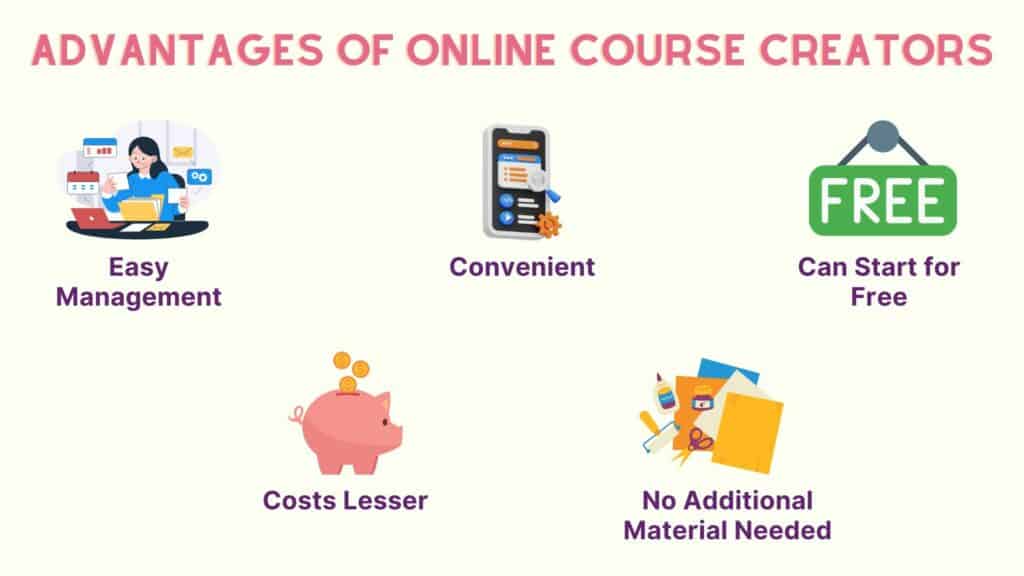
Enhanced Convenience
With online course creators, the instructor has the freedom to create courses any time they’re free. It also promotes self-paced learning so the students can learn at their own pace without the fear of missing out on the next lessons.
One-Time Effort
With an online course creator, you only need to record your video lecture once. Learners can keep revisiting the lessons any time they want. You can also include quizzes and assignments to improve your students’ retention rate.
No Additional Material Needed
Online teaching doesn’t require you to provide any notes or test sheets. Switching to an LMS platform will minimize your paperwork. You can simply supply PDF notes and video lectures to your students. Thus, no shipping charges or materials are required.
Costs Less
If you compare it to a traditional classroom, an online course costs way less. You don’t need any infrastructure or services for the students while teaching online. Thus, LMS platforms can help you deliver good quality education at cheaper prices.
Earn Passive Income
The interesting part about LMS platforms is that you can also put a price tag on your courses. You can easily sell your courses, offer promotional coupons to your students for more discounts, or offer them discounts on promoting your courses.
This will help you earn a passive income for yourself and reach a wider audience.
Easy Management
Whether it’s creating your course, adding learners, managing payments, or tracking analytics, everything is easy on an online course platform. Online course creators are user-friendly and easy to use.
Can Start for Free
The best part about using an LMS platform is that you can get started without investing a single penny. Many popular LMS platforms offer a feature-rich free plan that can help you start your online teaching journey.
Factors to Consider Before Choosing a Free LMS Platform
There are hundreds of free LMS platforms crowding the Internet. How do you figure out which one to choose? Well, before you choose a free online course platform, you need to ensure that it offers a few major features. Let’s look at them below.
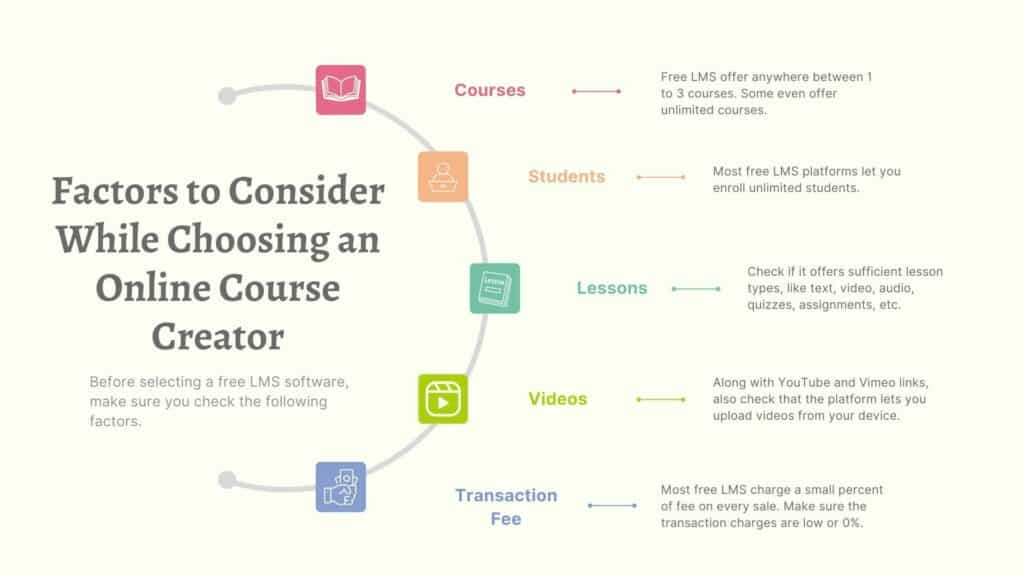
Courses Offered
The first thing to check is the number of courses your course creator offers. Most free course platforms let you create anywhere between 1 to 3 courses. Whereas, a rare few allow the creation of unlimited free courses.
Student Enrolment
The next factor to consider is the number of students you can enroll in your courses. Most free LMS platforms let you add unlimited students. Thus, always choose a platform that doesn’t restrict student enrolment.
Types of Lessons
Another important thing to look for in a course creator is the types of lessons it offers. If you wish to create interactive courses, you need to choose an LMS that offers text, video, audio, quizzes, assignments, etc.
Video Uploads
Usually, online courses put together various video lectures recorded by the instructor. Most LMS platforms let you embed YouTube or Vimeo links in your lessons, which don’t require any hosting service.
However, if you are creating video lectures, always choose a course creator that allows you to manually upload videos from your local device. Also, check the storage capacity of the LMS before getting started with it.
Transaction Charges
The last, and most important, factor to consider is the transaction fee charged on every sale. LMS platforms charge a small percentage of the fee when a learner purchases your course. Before choosing a course creator, ensure that it doesn’t charge a high transaction fee.
9 Best Free Online Course Creation Platforms (2024)
| Name | No. of Free Courses | No. of Students | Transaction Fee | Video Uploads | Visit |
| Thinkific | 1 | Unlimited | 0% | Yes | Visit |
| PayHip | Unlimited | Unlimited | 5% | No | Visit |
| FreshLearn | Unlimited | 25 | 0% | Yes | Visit |
| Teachable | 1 | 10 | $1 + 10% on every sale | Yes | Visit |
| EdApp | Unlimited | Unlimited | 0% | Yes | Visit |
| Ruzuku | Unlimited | 5 | 0% | Yes | Visit |
| Podia | N.A. | Unlimited | 8% | Yes | Visit |
| Talent LMS | 10 | 5 | 0% | Yes | Visit |
| TrainerCentral | 3 | Unlimited | N.A. | Yes | Visit |
Here, I have compiled a list of 9 of the Best Free Online Course Creators for 2024. You can use these platforms for creating, managing, and offering your courses for free to your learners. Let’s jump right into it!
1. Thinkific Free Plan – Best Overall Course Creator
Thinkific is one of the most popular online course creation platforms founded by Greg Smith in 2012. Thinkific helps you create, manage, market, and sell your courses with ease.

With its advanced customization, integrations, and detailed analytics, you can have full control over your online courses. The best part is that you don’t need to know a single line of code to operate Thinkific!
| No. of Courses | 1 |
| No. of Students | Unlimited |
| Types of Lessons | Audio, Video, PDFs, Text, Download, Presentation, Multimedia, and Live Lessons |
| Video Uploads | Yes (2 GB max) |
| Transaction Fee | 0% |
| Pricing | Free, Paid Plan Starts From $33 P.M |
| Website | Visit Thinkific |
Pros
1) Unlimited Students
The free plan of Thinkific allows you to enroll unlimited students to your online course. This is great if you have a large student base.
The best part is that you don’t need to enroll them manually. They can sign up for your online school by themselves.
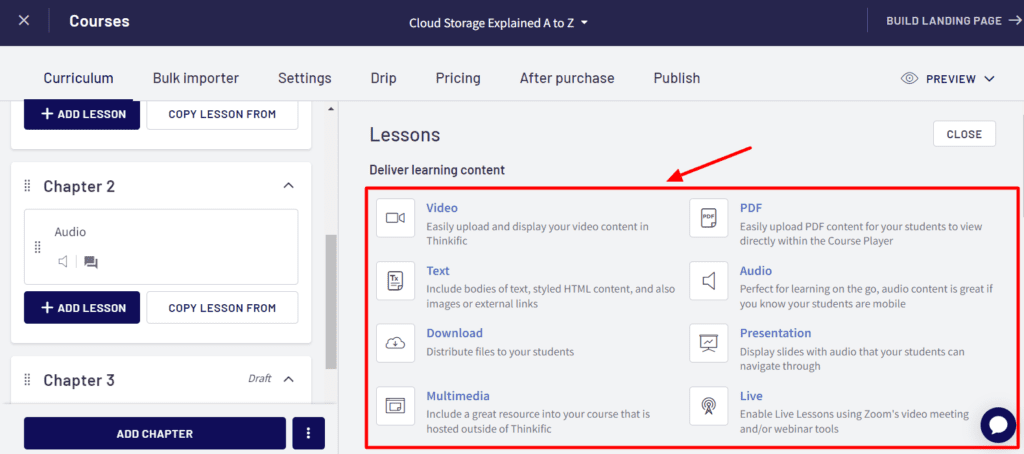
2) Multiple Lesson Types
To offer a better learning experience to students, Thinkific offers 8 types of lessons.
These include Audio, Video, PDFs, Text, Download, Presentation, Multimedia, and Live Lessons. However, coding lessons are not supported on Thinkific.
3) Video Uploads Allowed
Because you get free hosting on Thinkific, you are free to upload videos from your local device to the Thinkific library. However, the maximum file size allowed for videos is 2 GB.
4) No Transaction Fee
The best part about using Thinkific is that it doesn’t charge any transaction fee, even on the free plan. Thus, you don’t need to share a specific percentage of your revenue on every sale.
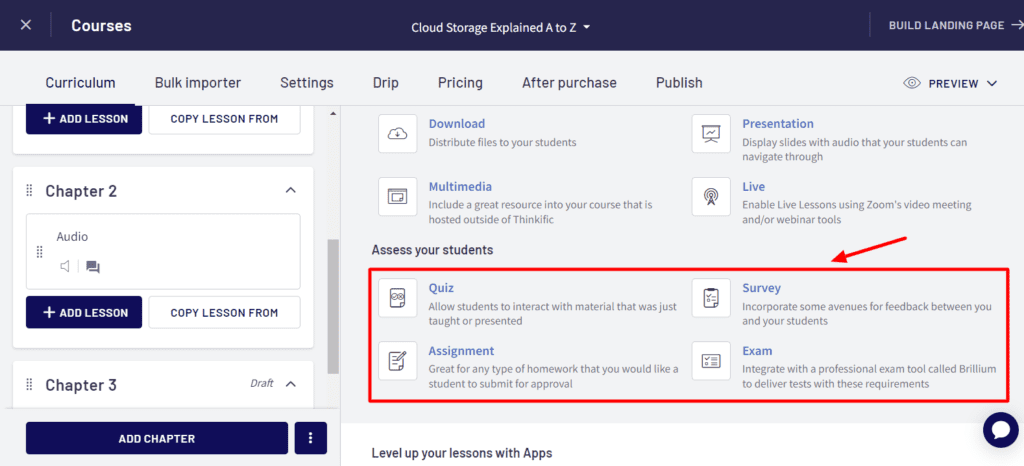
5) Quiz Features Available
With the free plan of Thinkific, you get the Quiz and Survey options. The quiz is available in an MCQ format, where you can specify if the question has one correct answer or more.
The Survey lesson basically lets you get the opinions of your learners about any topic.
It comprises 5 diverse types of questions, including one answer, multiple answers, rating, scale, and free text. You can choose any one of your choices, depending on your question type.
6) Lots of Integrations
In the Thinkific app store, you can find 45+ free apps. These include popular services like MailChimp, ConvertKit, Constant Contact, Google Analytics, Facebook Pixel, Segment.io, Mix Panel, Zapier, and more.
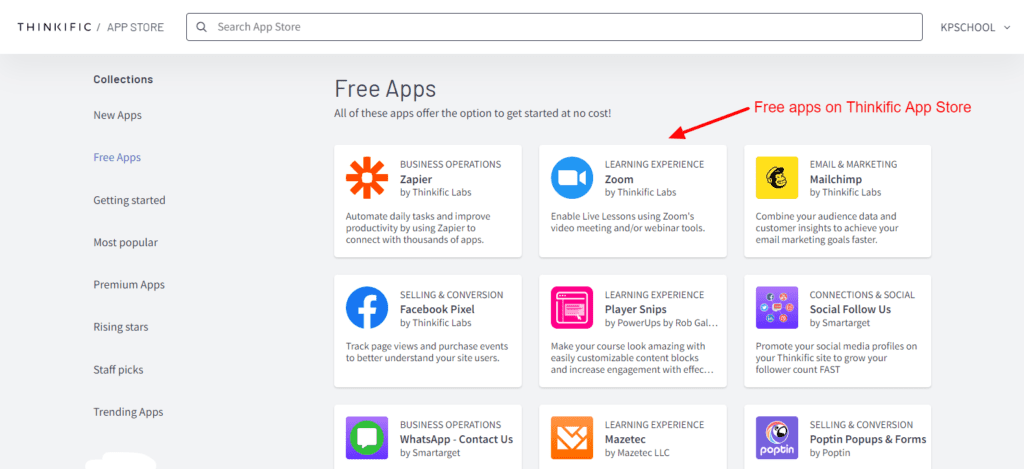
7) Student Discussions Allowed
Under every lesson of your course, you can add a discussion section for your students. This would help learners interact with each other and start healthy communication.
8) Beautiful Themes Available
Thinkific comes with three beautiful themes that you can apply to your online academy. This is great if you wish to customize the appearance of your courses.
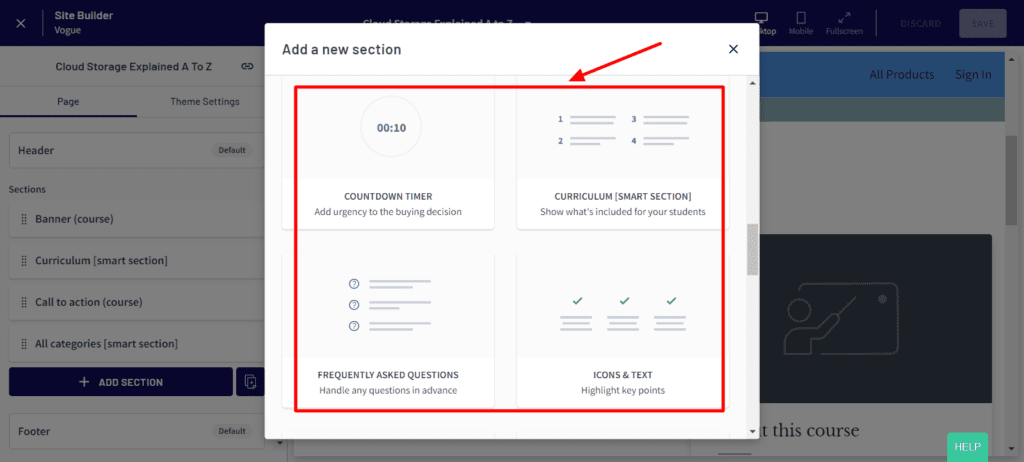
9) Easy to use Landing Page Builder
With Thinkific, you get some interesting elements that you can add to your landing pages.
These include Advanced Elements, Upsells, Countdown timer, Testimonials, FAQ, Banner, CTA, etc. These elements can help you create more catchy and impressive landing pages.
Cons
1) Only 1 Course
You can only publish a single course on Thinkific. This is quite limited when it comes to setting up your own online academy.
2) No Coding Lessons
If you are a coding instructor who wants to offer programming lessons to your students, Thinkific won’t be helpful to you.
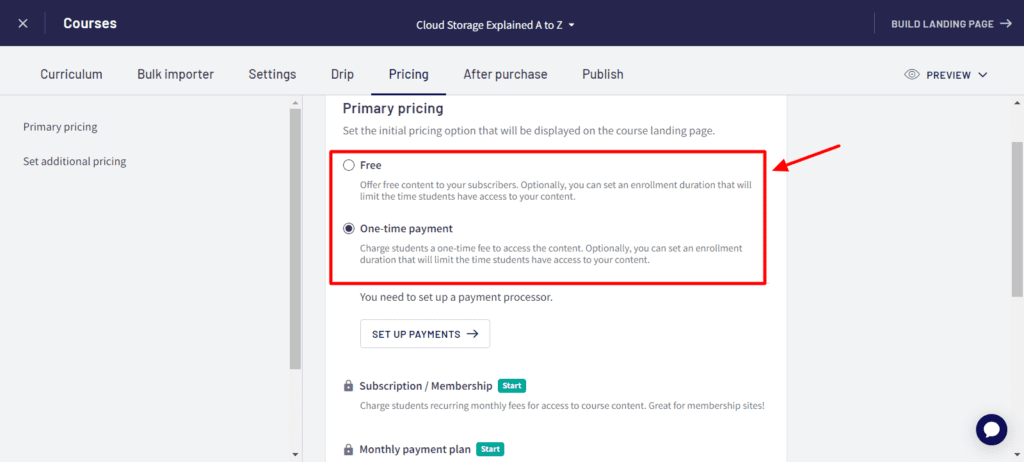
3) Limited Student Payment Models
On the free plan, you can only offer courses for free or on one-time payments. If you wish to implement the subscription or monthly payment options, you need to upgrade to its paid plan.
Thinkific Demo Course
I created a demo course for testing out all the features of the Thinkific course creator. Here, I uploaded various types of lessons, including text, video, PDFs, etc. I also created quizzes and survey lessons.
I personally liked the Survey Lessons, Quizzes, and Landing page elements offered by Thinkific. You can check the demo course by creating a free Thinkific account.
Conclusion
Overall, the free plan of Thinkific lets you create 1 course with unlimited learners. It also offers multiple lessons, quizzes, integrations, and customization options.
And the best part is that it doesn’t charge any transaction fee either! Overall, this would be a really efficient LMS platform for newbies.
They can test out all the features by creating their first course. And once they start getting some traffic, they can upgrade to the paid plan to offer more courses.
2. PayHip – Best for Professional Features
PayHip is an e-Commerce platform founded by Abs Farah in 2012. It helps you sell a variety of digital products and services online to your customers.
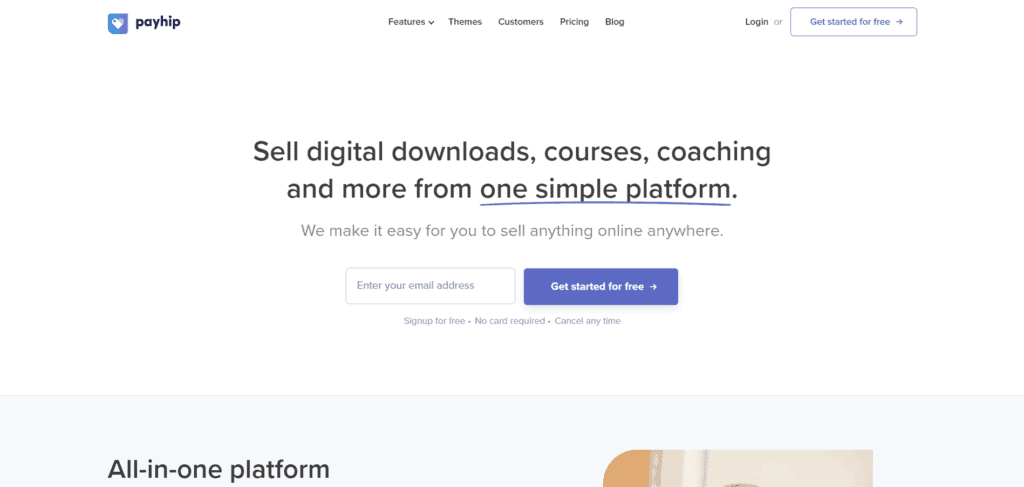
As of now, PayHip is being used by 130k+ creators to sell their services. The best part is that creating and selling anything with this platform is effortless.
| No. of Courses | Unlimited |
| No. of Students | Unlimited |
| Types of Lessons | Text, Video, Quiz, Download, Survey, Assignment, Embed |
| Video Uploads | Need to sign up for PayHip Videos service |
| Transaction Fee | 5% |
| Pricing | Free, Paid plan starts at $29 P.M |
| Website | Visit PayHip |
Pros
1) Can Sell Multiple Types of Products
This platform is not just limited to selling online courses. You can also sell digital products, memberships, and physical products on it.
2) Unlimited Products and Customers
You can have unlimited products and customers/students on the free plan, which is great for beginners.
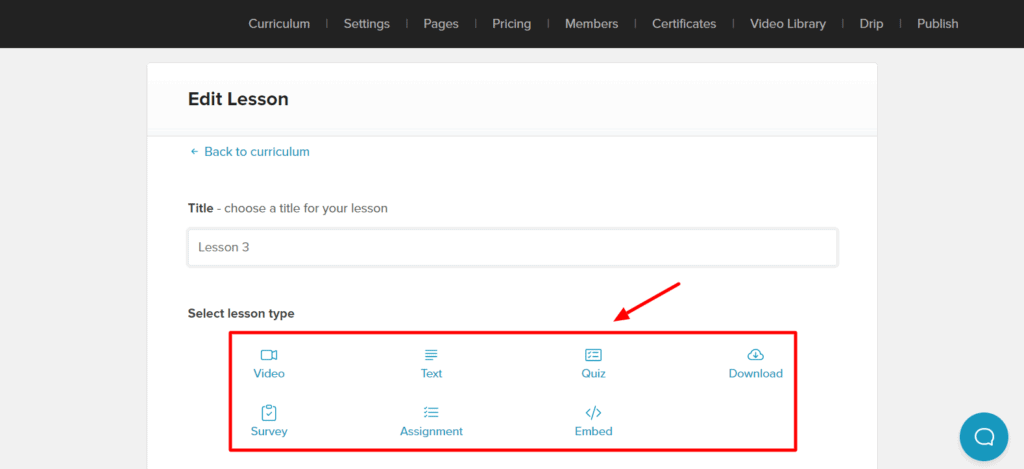
3) Multiple Lesson Types
For offering a more effective learning experience to your students, PayHip lets you offer a variety of lessons. These include text lessons, videos, quizzes, downloads, surveys, assignments, embeds, and MCQ quizzes.
4) Custom Domain Allowed
Unlike other platforms, you get to add your custom domain to PayHip, even on its free version. If you want to have an online brand or company, you can streamline it in your online courses as well.
5) Excellent Marketing Options
To promote your courses and digital products with ease, PayHip offers content marketing features like referrals, coupon codes, affiliate marketing, and social discounts.
With these options, you can encourage learners to market your courses on social media and receive discounts.
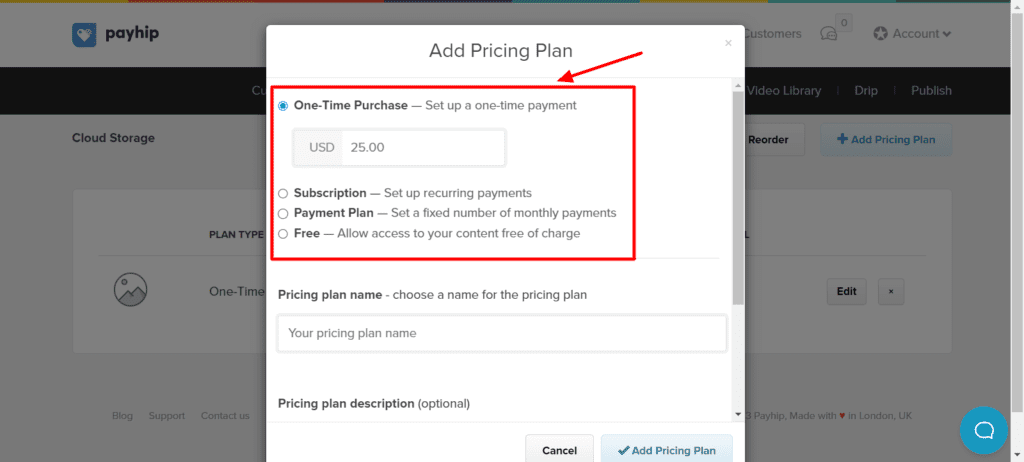
6) Multiple Student Payment Models
It supports a variety of payment models for customers, like Free products, One-time payments, subscriptions, and payment plans.
7) Drip Scheduling
In case you don’t want to release all the lessons in your courses at once, you can enable the drip schedule. It will help you specify the number of days or specific days after which to make the content available.
8) Good Email Marketing Features
If you want to send out email notifications to your students or customers, you can easily set up mailing lists by connecting with over 12 popular email providers.
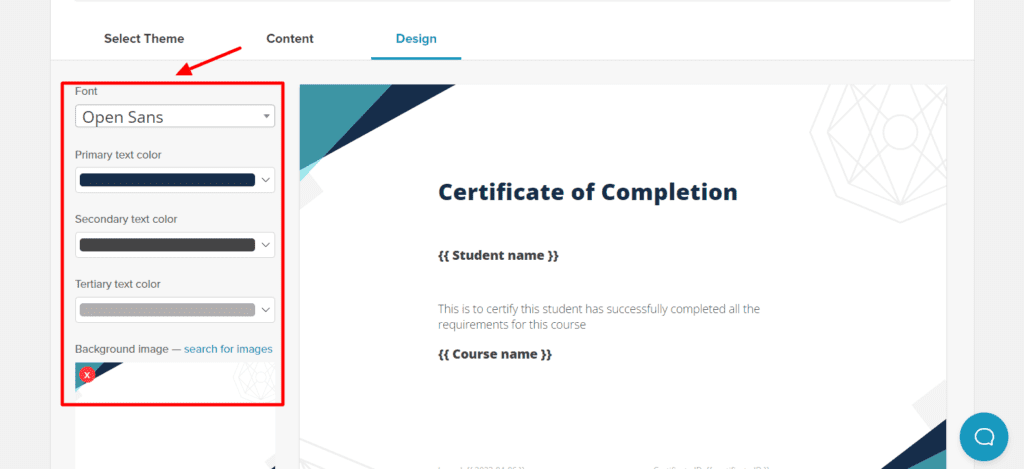
9) Award Certificates
PayHip also offers 7 certificate templates that you can offer to your learners. You can quickly edit content, colors, background image, font, and logos to personalize your certificates.
10) Basic Analytics and Reports
PayHip comes with some basic analytics around your courses and students. However, if you need advanced analytics, you can connect Google Analytics and Facebook Pixel as well.
Cons
5% Transaction Fee
A 5% transaction charge is applied on every sale that you make through PayHip.
Conclusion
Overall, PayHip is an excellent eCommerce platform if you are planning to sell your online courses, memberships, or digital products. It comes with advanced functionality like the custom domain, marketing tools, certifications, drip schedule, and more.
However, it charges a 5% transaction fee on every sale, which is a major downside. This platform would be best for anyone who is planning to sell something online and needs professional features to manage their courses and products.
3. FreshLearn – Best For Landing Pages and Coupons
FreshLearn is a platform for creating and selling your online courses and digital products. It was founded by Rahul Mehta in the year 2020.
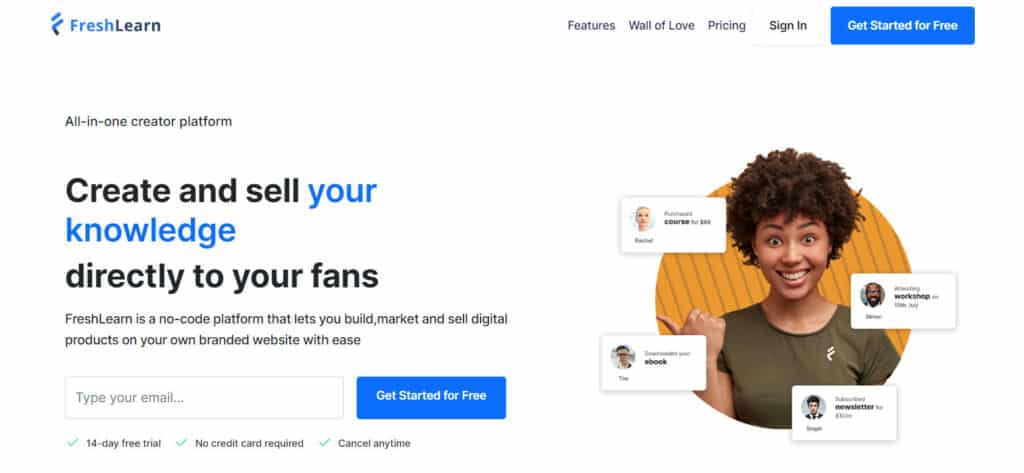
It comes with a wide range of features that are suitable for beginners as well as professional users.
| No. of Courses | Unlimited |
| No. of Students | 25 |
| Types of Lessons | Video, Audio, Doc, Live Lessons |
| Video Uploads | Yes |
| Transaction Fee | 0% |
| Pricing | Free, Paid plan starts at $39 P.M |
| Website | Visit FreshLearn |
Pros
1) Attractive UI
The user interface of FreshLearn is quite modern and pleasing with vibrant icon colors. It looks quite clean, well-organized, and friendly for newbies.
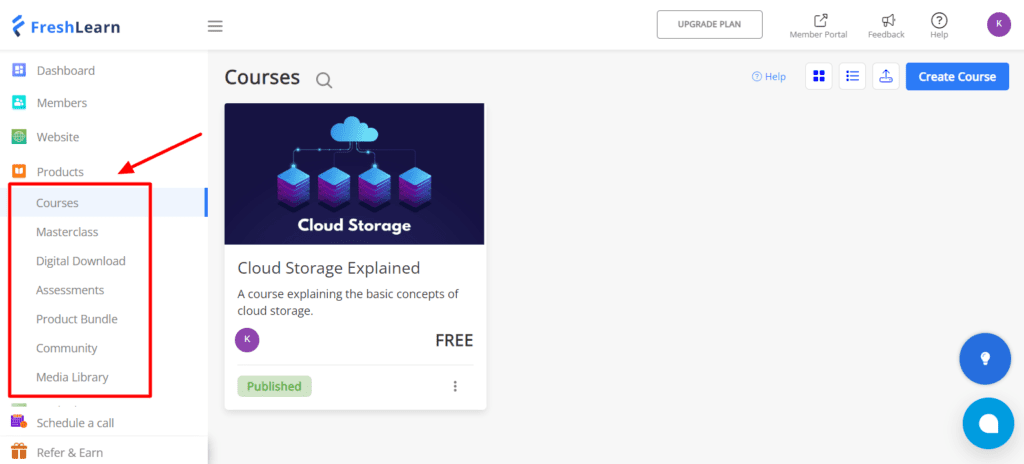
2) Can Create Multiple Products
Apart from creating online courses, FreshLearn also lets you create and sell digital downloads, podcasts, blogs, product bundles, and master classes.
3) 0% Transaction Fee
Unlike many other LMS platforms, FreshLearn doesn’t charge you any transaction fee on any of its plans.
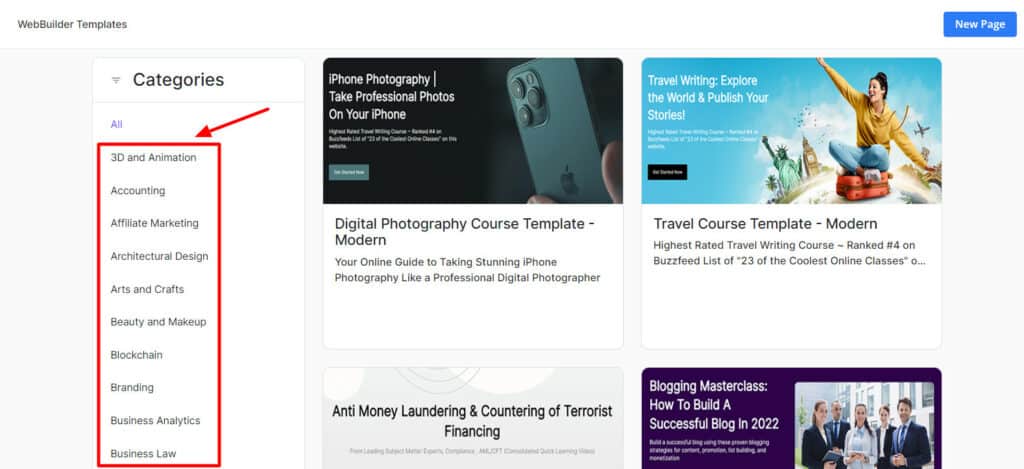
4) 200+ Customizable Landing Page Templates
You can easily create custom landing pages for your online courses. It offers an extensive library of 200+ templates that you can edit as per your requirements. You can add blocks, edit background and colors, insert fonts, etc.
5) Attractive Assessments
You can create interactive assessments with single and multiple-choice questions. It lets you design your assessment using building blocks like Questions, Lead Form, Welcome, Instructions, Result, etc. These can be integrated into any of your courses.
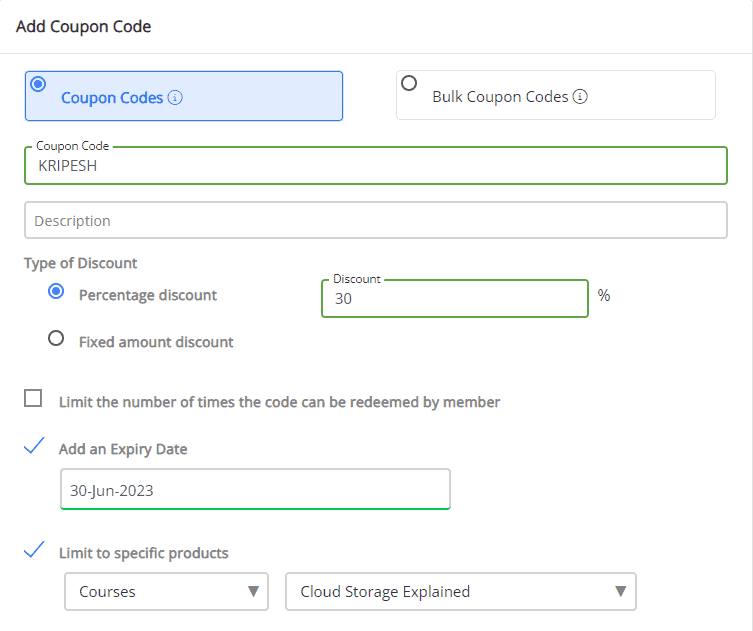
6) Can Create Coupon Codes
Even on the free plan of FreshLearn, you can create single-use coupon codes. Apart from entering the coupon name, it lets you specify a discount percentage or fixed amount discount, the number of times it can be redeemed, its expiry date, and the products that it applies to.
7) Advanced Drip Scheduling
If you wish to schedule your lessons, the Drip Schedule feature can be helpful. It lets you drip your lessons by the number of days, a specific date, or chapter completion.
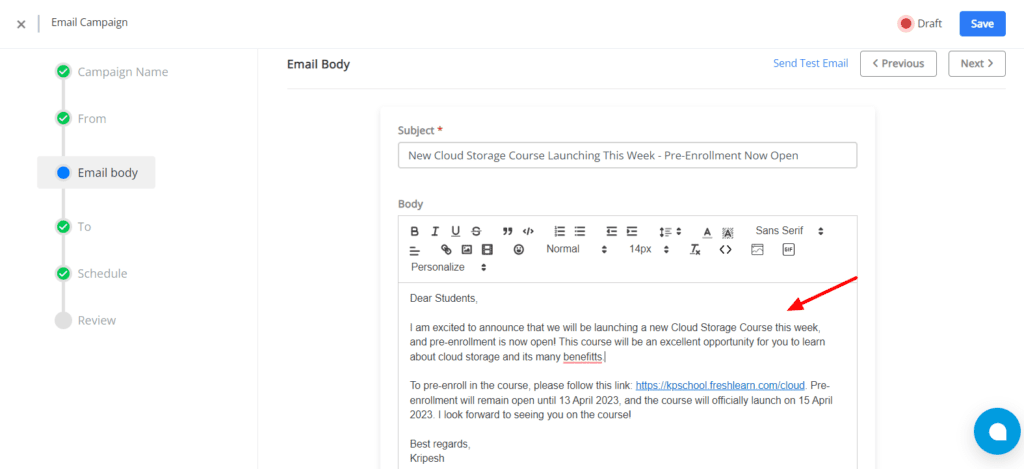
8) Impressive Email Marketing
On FreshLearn, you can effectively market your courses through their email campaigns. You are allowed to send a maximum of 100 emails per campaign. This feature is in the beta stage right now, but it looks quite powerful.
Cons
1) Limited Enrolments
You can only enroll a maximum of 25 students on the free plan. Also, users cannot sign up via links. You need to manually enroll them or upload a CSV for bulk enrolment.
FreshLearn Demo Course
I created a demo course for testing out all the features of the FreshLearn course creator. Here, I uploaded various types of lessons, including text, audio, video embeds, video uploads, PDFs, etc. I also created quizzes and assignments.
I personally liked the various assignment blocks and coupon code features offered by FreshLearn. In order to access this course, you need to register with your email id for free.
Conclusion
Overall, FreshLearn looks like a really impressive free course creator. It offers all the essential features like unlimited courses, multiple products, drip scheduling, coupon codes, hundreds of landing page templates, email campaigns, and more.
However, you can only enroll up to 25 students in your online academy, which is quite low. If you are a beginner in the online course creation industry, you can start with this platform.
4. Teachable – Best for Lesson Types
Teachable is a renowned course creation platform founded by Mr. Ankur Nagpal in 2013. This platform is primarily focused on marketing and selling your online courses.
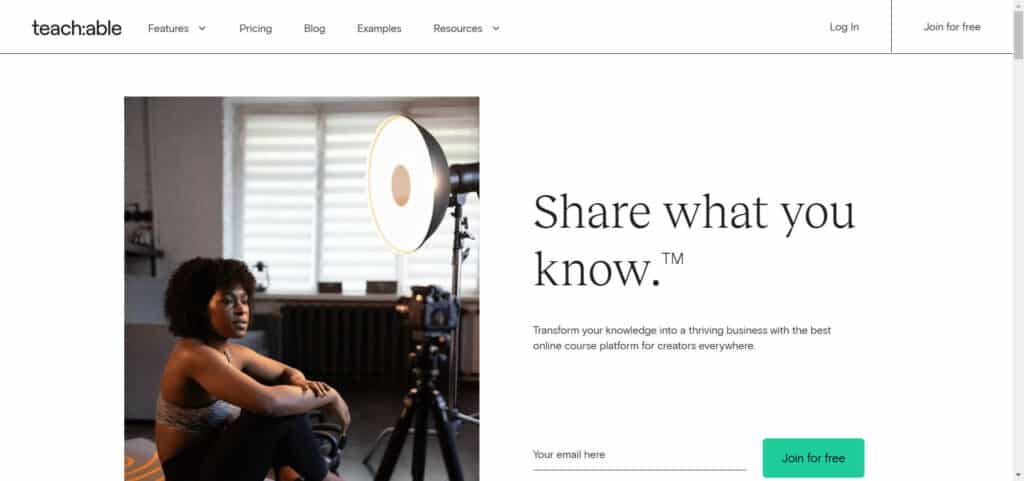
Along with selling your courses, you can also create and sell a variety of digital products and services on it.
| No. of Courses | 1 |
| No. of Students | 10 |
| Types of Lessons | Video, PDF, Audio, Text and Image, Banner Image, Resource, Coding Lessons |
| Video Uploads | 10 videos max |
| Transaction Fee | $1 + 10% on every sale |
| Pricing | Free, Paid plan starts from $39 P.M |
| Website | Visit Teachable |
Pros
1) Multiple Lesson Types
Teachable lets you create a variety of lessons to help students learn effectively. These comprise video lessons, PDFs, audio, text and Images, Banner Images, Resources, and Coding Lessons.
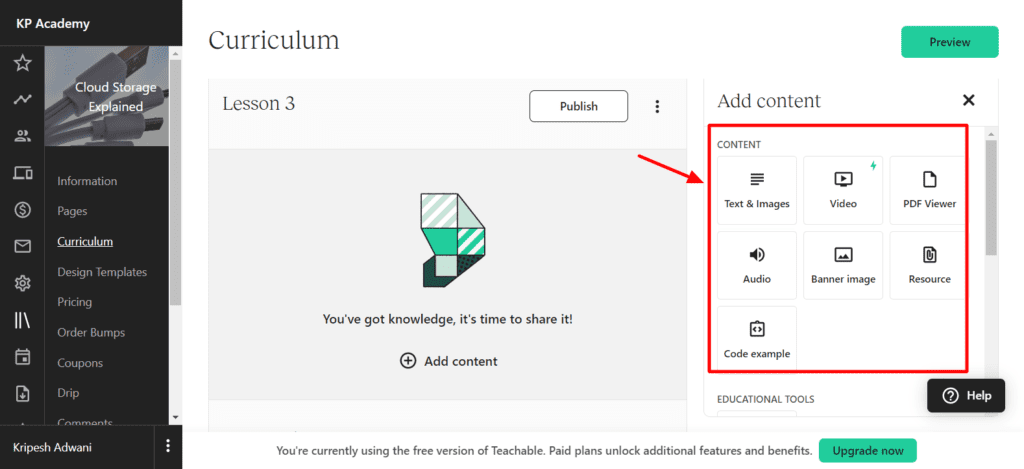
Thus, if you are an instructor who teaches computer science or web development, you’ll find the color-coded lessons for different programming languages very helpful.
However, you won’t find survey lessons or Live lessons here.
2) MCQ Quizzes Available
For evaluating your students, you can implement Teachable’s MCQ questions quiz. However, in the free version, the grades for quizzes are not recorded. Along with that, you don’t get to add any answer explanations either.
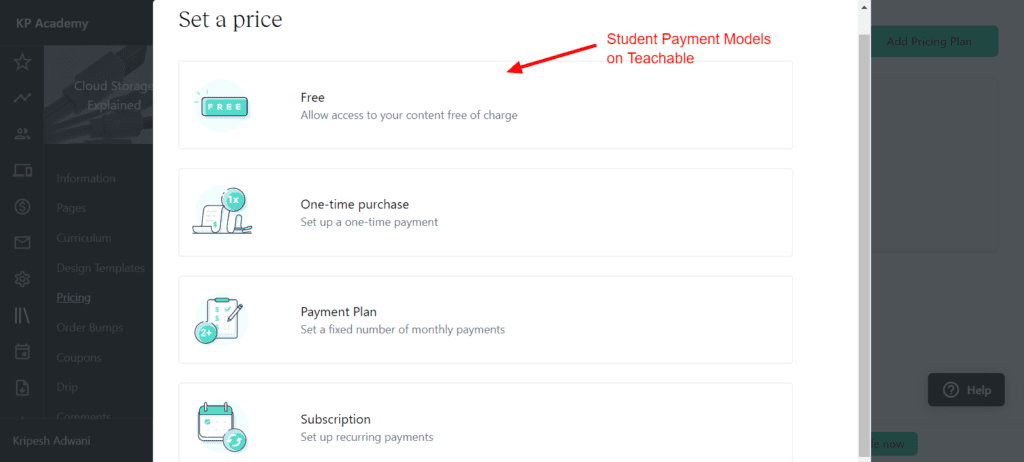
3) Lots of Student Payment Models
On Teachable, you can find 4 different types of student payment models. Thus, you can sell your courses for free, for a one-time payment, on a payment plan, or as a subscription.
4) Student Comments Allowed
Students are allowed to leave their feedback in the form of comments in every lesson. This is good to improve user engagement and promote a healthy conversation.
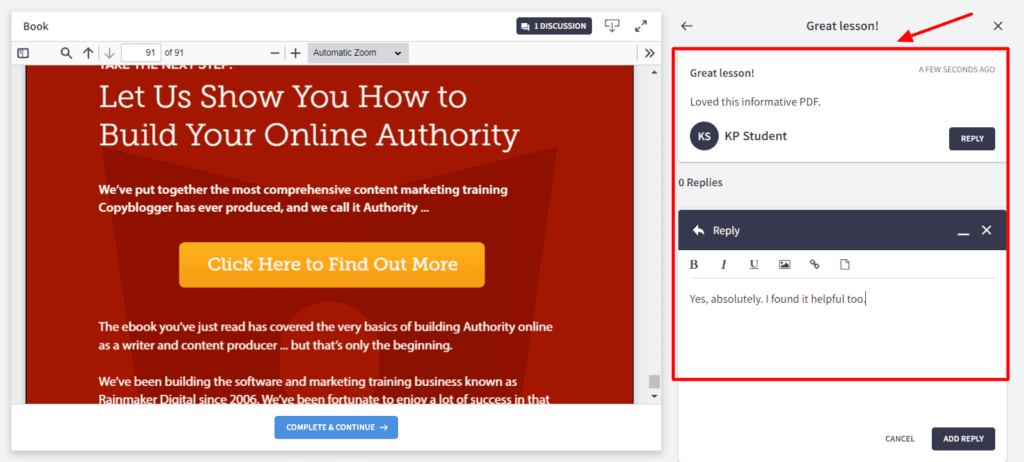
5) Decent Security Features
To enhance the security of your platform, Teachable lets you anonymize visitors’ IP addresses and add reCaptcha to learners’ login pages to prevent spam.
6) Good Analytics Reports
Talking about analytics, Teachable offers a whole range of reports. These include analytics for new sign-ups, earnings, revenue, sales, active students, and lesson completions.
These statistics can help you monitor your sales and keep track of your students and courses.
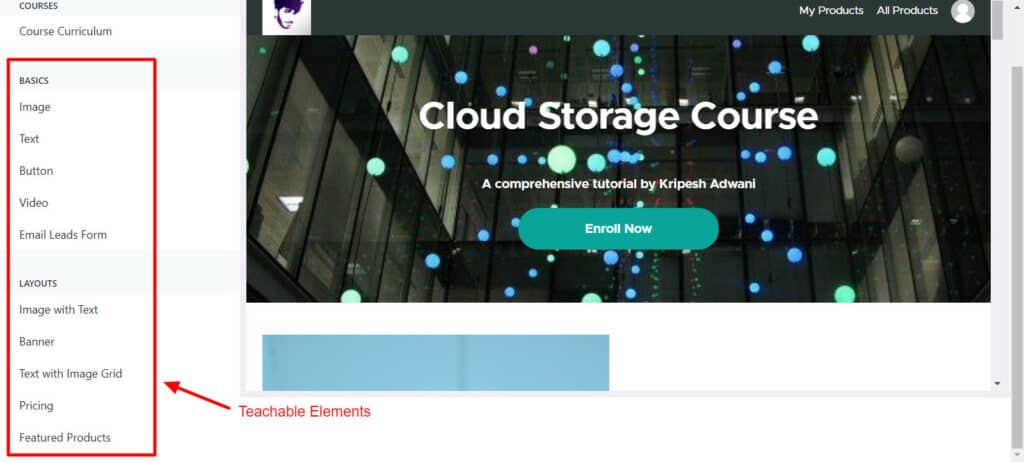
7) Basic Site Customization
If you want to change the appearance of your site or course pages, Teachable offers some basic elements and customizations. You can edit the site colors, logos, and banners, add new blocks, etc. You also get two basic design templates for your courses page.
Cons
1) Limited Students
As per a recent update, you can now enroll only 10 students on your Teachable platform. You can enroll them manually via email. Students cannot sign up by themselves.
2) High Transaction Charges
Teachable charges a high transaction fee from its users. On every sale, Teachable charges $1 along with a 10% share of every sale. This is especially high for beginners in the online teaching industry.
3) No Emails and Integrations
You don’t get to send any emails to your students. It also does not integrate with any third-party services on the free plan, except Stripe Payments for Indian users.
Teachable Demo Course
I created a demo course for testing out all the features of the Teachable course creator. Here, I uploaded various types of lessons, including text, coding lessons, videos, PDFs, etc. I also created quizzes and assessments.
I personally liked the coding lessons and analytics reports offered by Teachable.
Conclusion
The free plan of Teachable offers you 1 published course with 10 student enrolments. It comes with a variety of lesson types, payment models, good security, analytics reports, and customizations.
However, it charges a high transaction fee, even on the free plan! Overall, Teachable is one of the best online course platforms for those who need advanced lesson types like coding lessons and good security and analytics.
5. EdApp – Best for Mobile Courses
EdApp is an easy-to-use online learning platform that aims to make learning more effective. Founded by Darren Winterford in 2015, it currently has thousands of learners in 90+ countries.
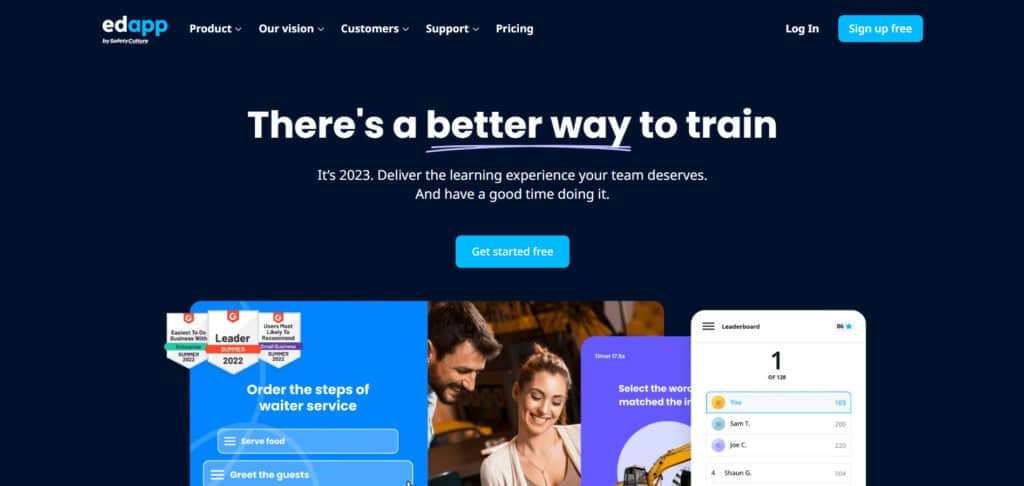
EdApp is basically designed for mobile devices and you can create your course content in mobile format. This software makes it easy to design employee training programs and interactive courses for students.
| No. of Courses | Unlimited |
| No. of Students | Unlimited |
| Types of Lessons | Text, Image, Video, Quiz, Games, Virtual Classroom |
| Video Uploads | Yes |
| Transaction Fee | 0% |
| Pricing | Free, Paid plan starts at $2.95/active user P.M |
| Website | Visit EdApp |
Pros
1) Unlimited Courses and Students
There is no restriction on the number of courses you can create and students you can enroll. Students can be invited by email or via public links. EdApp comes with a library of 1000+ pre-designed courses that you can directly import and edit.
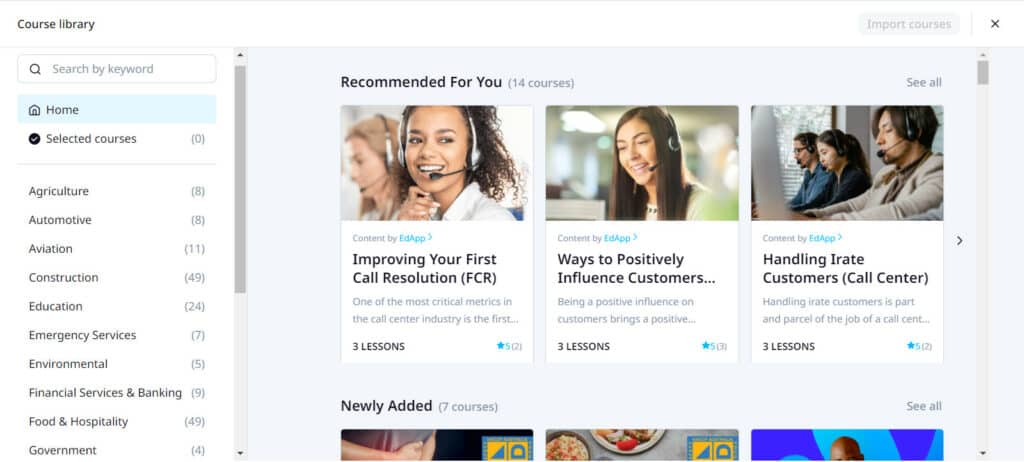
2) Variety of Lessons
On EdApp, lessons are available as Slide Templates. You can include text, images, videos, quizzes, feedback, comments, and even games in your courses.
3) Lots of Integrations
EdApp integrates with lots of popular services like Zapier, BambooHR, Cornerstone, Deputy, Canva Library, Unsplash Library, and more. What impressed me most was that you can directly design images in Canva within Ed LMS and publish them in the media library.
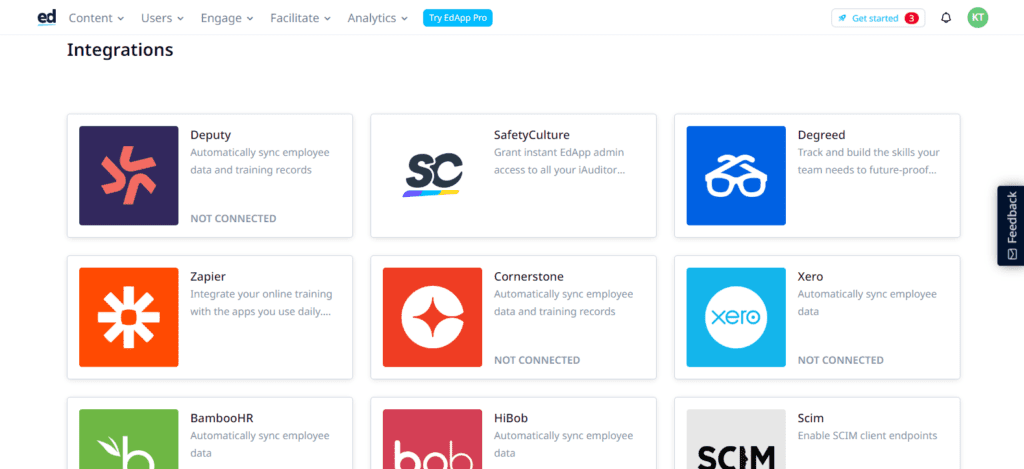
4) Drip Scheduling
If you want to streamline how your lessons are consumed, the drip schedule feature can help you. On enabling it, you can specify a date or number of days after enrolment when every lesson should be launched.
5) Additional Features
You also get some additional features like group training, social learning, and comments. If you want to invite users to your courses, you can do so using email, links, QR codes, or manual codes.
Cons
1) Only Free Courses
The biggest downside of EdApp is that you can’t sell your courses. You are only allowed to create courses and offer your students for free.
EdApp Demo Course
I created a demo course for testing out all the features of the EdApp course creator. Here, I uploaded text lessons and practical assessments.
I personally liked the interactive games and quiz questions offered by EdApp. In order to access my demo course, you need to register for a free account on EdApp.
Conclusion
Overall, EdApp is a great solution for those instructors who want to offer their courses in mobile format. It comes with a variety of features and course templates to speed up the course creation process. However, they don’t let you sell your courses.
Thus, it would be best for those instructors and teachers who simply want to offer free education to their students on their mobile phones.
6. Ruzuku – Best for Beginners
Ruzuku is another online course creation platform founded by Abe Crystal in 2012. Their primary aim behind creating it was to streamline the process of course creation for instructors.
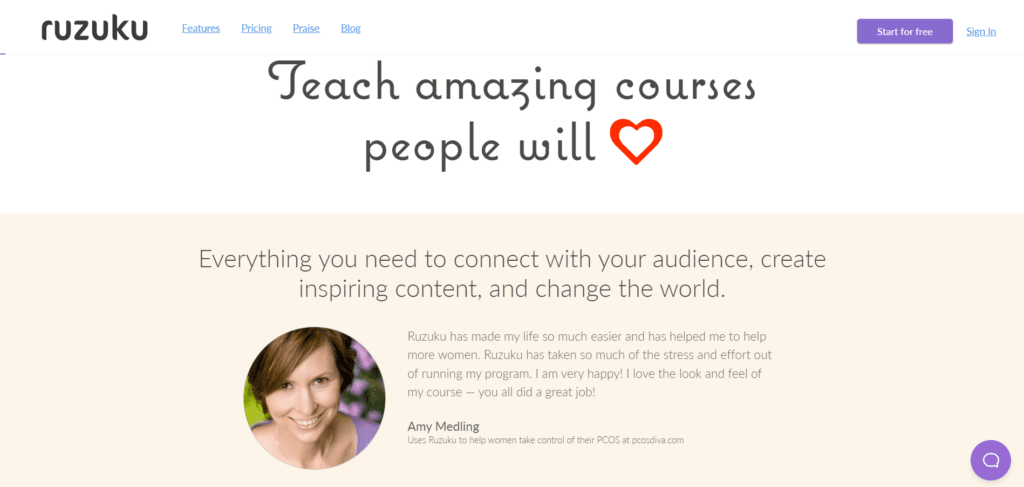
This online course creator offers a range of features that are most suitable for someone who is starting out with their first online course.
| No. of Courses | Unlimited |
| No. of Students | 5 |
| Types of Lessons | Text, Audio, video uploads, file, PDF, HTML embed, Live meetings, and Downloadable content |
| Video Uploads | Allowed |
| Transaction Fee | 0% |
| Pricing | Free, Paid plan starts from $99 P.M |
| Website | Visit Ruzuku |
Pros
1) Unlimited Courses
You can create unlimited courses in Ruzuku. However, there’s a limit on student enrolments on the free plan.
2) Multiple Lesson Types
You can create a variety of lessons in Ruzuku. For instance, text lessons, audio, video uploads, files, PDFs, HTML embeds, Live meetings, and Downloadable content. These are quite good for a free course creator.
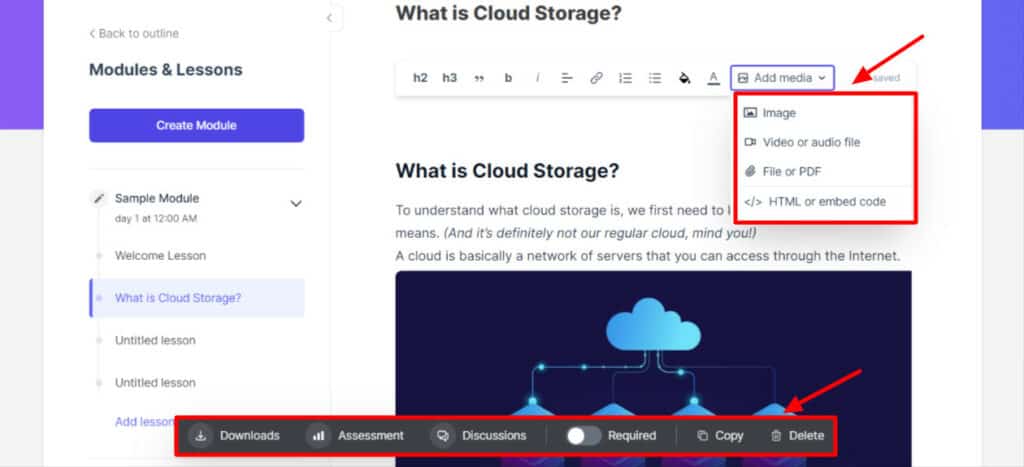
3) Live Classes
Ruzuku lets you choose one of the following options for conducting live online classes with your students – video conference, presentation, Zoom, or an external platform like Google Meet, etc.
4) No Transaction Fee
What impresses me about Ruzuku is that it doesn’t charge any transaction fee on every sale you make through this platform. So everything you earn is completely yours.
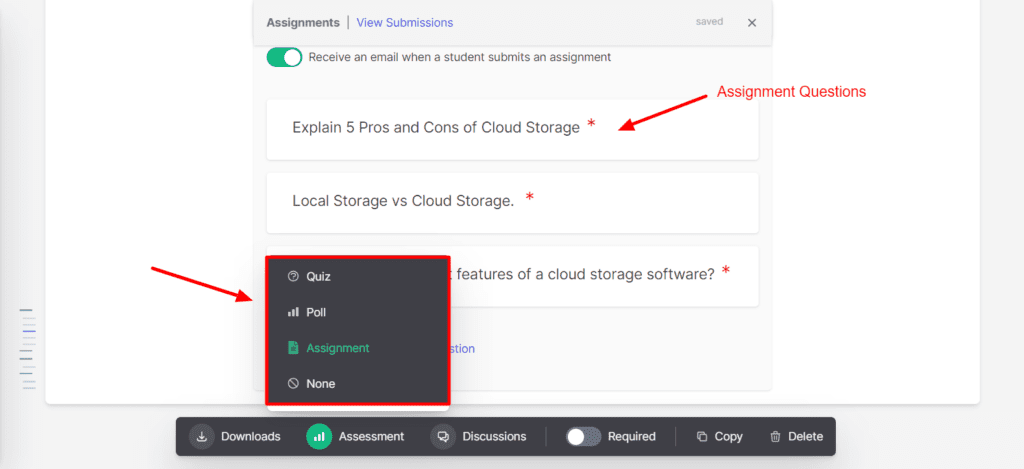
5) Variety of Quizzes
For a seamless evaluation of your students, Ruzuku lets you create MCQ Quizzes, Polls, and Assignments. Students can submit their assignments as PDFs, video, text, and image files, which is highly convenient.
6) Content Dripping
If you don’t want to make all your lessons available together, you can enable drip scheduling with Ruzuku. With this feature, you can set a specific date or specify the number of days after which a lesson would be available.
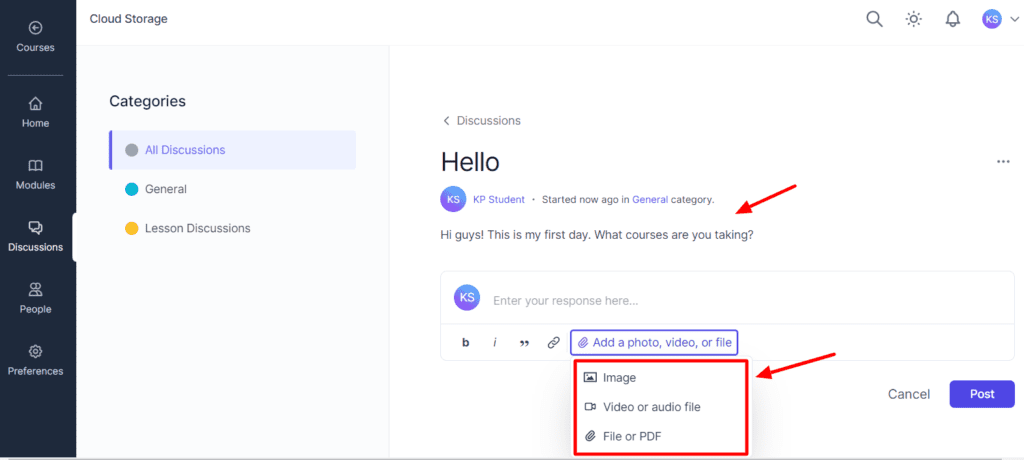
7) Decent Student Engagement
For enabling healthy communication among students, Ruzuku lets you create an online community. Additionally, learners are free to start discussions under lessons as well.
8) Emails and Notifications
You can easily send orientation notification emails to your students with a specific frequency, like daily, immediate, or none. Along with that, you can also create messages and schedule a date for sending them out to your learners.
Cons
1) Limited Students
You can only enroll a maximum of 5 students, which is quite limited if you’re planning to build your online academy.
2) Restrictions on Student Payment Models
Instructors can access the student payment models only after they add a payment gateway. Only a free course can be added without integrating a payment gateway.
Ruzuku Demo Course
I created a demo course for testing out all the features of the Ruzuku course creator. Here, I uploaded various types of lessons, including text, video, PDFs, etc. I also created quizzes, assignments, and polls.
I personally liked the quizzes and poll options presented by Ruzuku.
Conclusion
Overall, Ruzuku is a pretty efficient LMS platform that lets you create unlimited courses and offers a variety of lesson types, quizzes, and engagement options. But what I liked most about it is its drip schedule feature and 0% transaction charges!
However, with a limitation on the number of student enrolments, it could be a less desirable option for most users. In my opinion, if you’re an absolute newbie, you can experiment with Ruzuku to get the feel of how LMS software works.
7. Podia – Best for Email Marketing
Podia is a renowned online course creation platform founded by Spencer Fry in 2014. It helps you sell multiple types of products, like online courses, digital downloads, webinars, coaching sessions, etc.

As of now, Podia is being used by over 150k creators around the globe to sell their digital products.
| No. of Courses | N.A. |
| No. of Students | Unlimited |
| Types of Lessons | Text, Embed, Quiz, Coaching, Files |
| Video Uploads | Allowed |
| Transaction Fee | 8% |
| Pricing | Free, Paid plan starts from $33 P.M |
| Website | Visit Podia |
Pros
1) Multiple Products and Unlimited Customers
Podia lets you create multiple types of products, including online courses, digital downloads, webinars, bundles, and coaching sessions. You are free to offer them to unlimited learners and customers.
2) Decent Lesson Types
To impart quality education to your online learners, Podia offers different types of lessons. These include text lessons, embeds, quizzes, coaching, and file uploads. However, the free plan only supports 1 coaching product and 1 digital download.
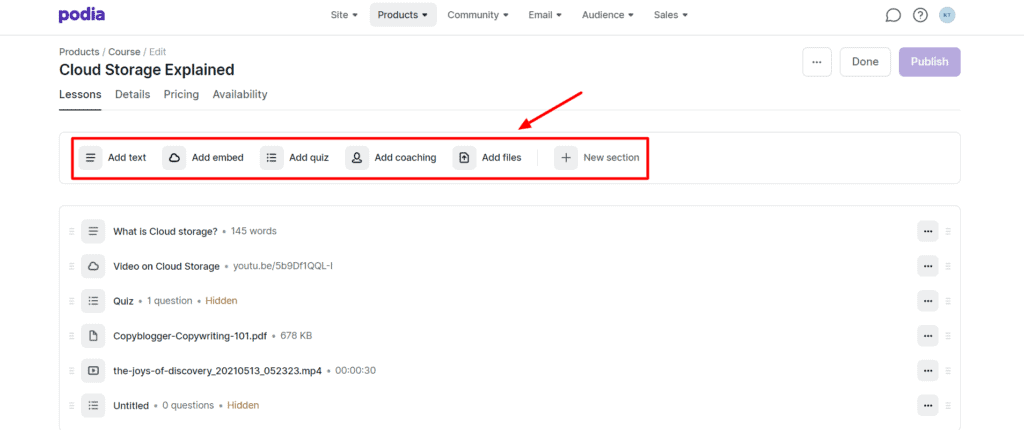
3) Lots of Integrations
Podia offers 3rd-party integrations with multiple services. These include Zoom, ConvertKit, MailChimp, Aweber, Active Campaign, GetResponse, MailerLite, and more.
4) Multiple Student Payment Models
Podia offers the following payment models for students: Free Courses, Monthly Payments, and One-Time Payments. However, payment models are only visible once you connect Stripe or PayPal to your account.
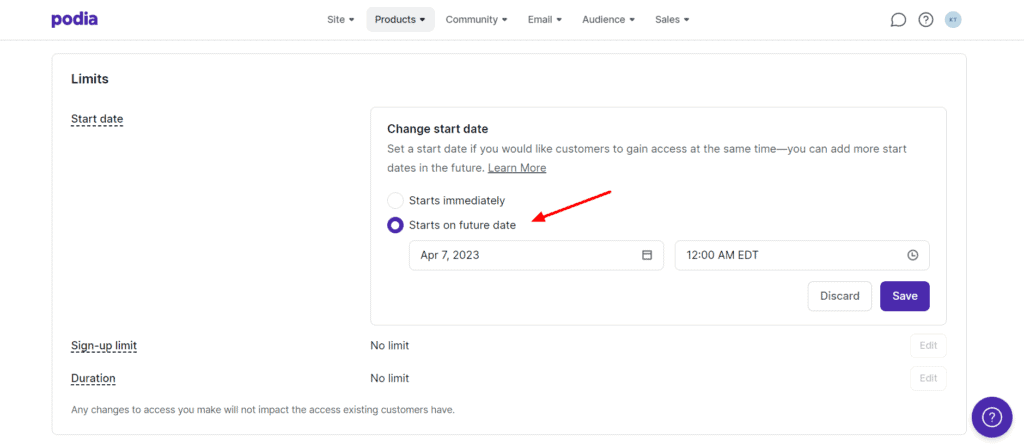
5) Drip Content Available
If you don’t want to release all lessons in your course together, you can set up a drip schedule.
This feature helps you specify a start date for your course. You can specify the number of days each lesson should be delayed. Along with that, it also lets you mention a sign-up limit and duration.
6) Options for User Engagement
For building a healthy student community, you get interesting user engagement options. For instance, customer messaging and community support with unlimited members and unlimited topics
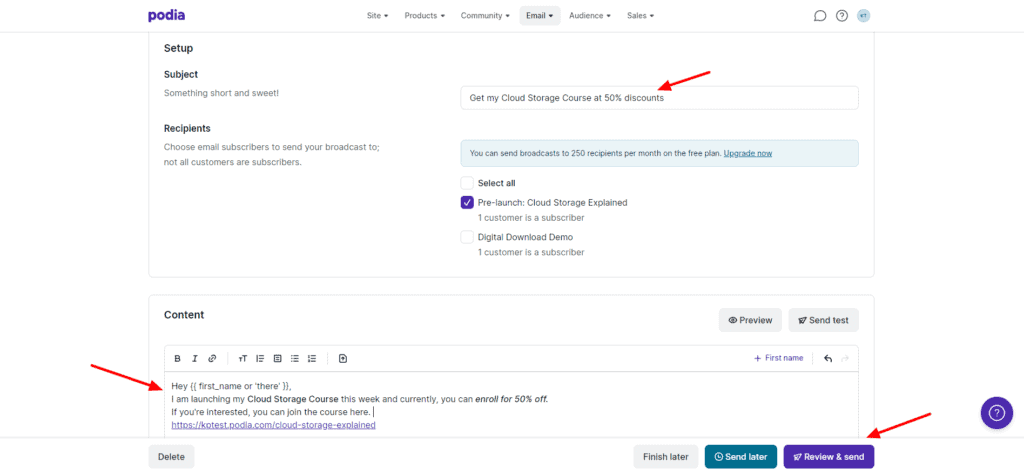
7) Impressive Email Marketing Features
The free plan of Podia gives you access to 250 broadcast emails/month, 250 imported emails, and 1 active email campaign. You can send 3 emails per campaign. By default, Podia tracks email opens and email clicks as well.
Cons
1) Cannot Sell Courses
The biggest drawback of Podia is that it doesn’t allow you to publish your courses. You can simply publish and offer them for free.
2) 8% Transaction Fee
Even though it does not allow you to sell your online courses, it charges an 8% transaction fee for selling digital products.
3) No Analytics Reports
You don’t get any analytics reports for your students, courses, etc on the free plan.
Podia Demo Course
I created a demo course for testing out all the features of the Podia course creator. Here, I uploaded various types of lessons, including text, videos, PDFs, etc. I also created quizzes in my course.
I personally liked the MCQ quizzes and downloadable content options offered by Podia.
Conclusion
Podia is one of the most popular course creation platforms out there. It comes with multiple product types, lessons, integrations, and payment models. The free plan is even equipped with advanced features like drip scheduling, email notifications, and more.
However, you can’t sell your online courses, which is a major drawback. A transaction fee of 8% on selling digital products is another disadvantage. Thus, if your motive is to sell your online courses, Podia won’t be the right choice for you.
8. Talent LMS – Best for Advanced Lesson Types
TalentLMS is a cloud-based online course creation software that was founded by Athanasios Papagelis in 2012.
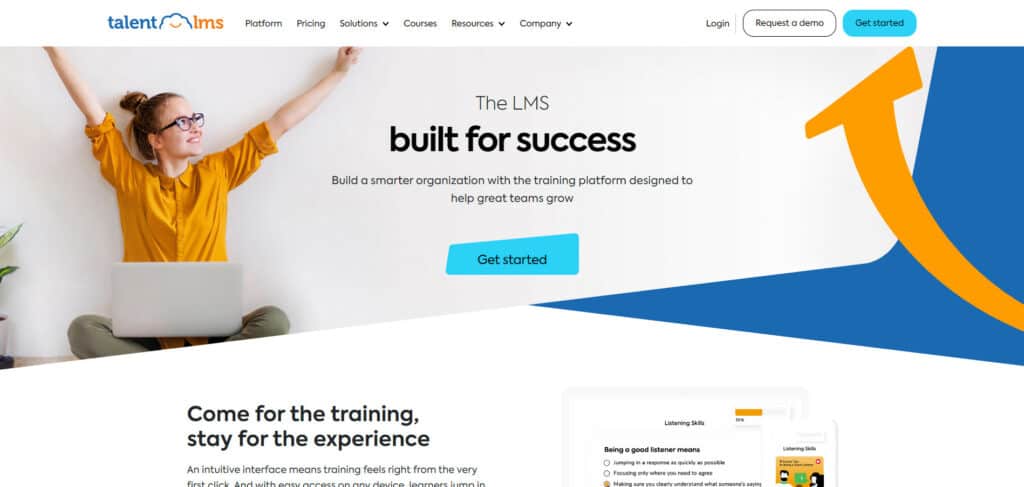
It is currently used by more than 70k teams and offers helpful features for building, assessing, and selling your courses. It is mainly designed to provide training courses to employers, customers, and students.
| No. of Courses | 10 |
| No. of Students | 5 |
| Types of Lessons | Text, Web Content, Video (Youtube link, presentation, video upload), Audio, Presentation, iFrame, Scorm |
| Video Uploads | 100 MB max file size |
| Transaction Fee | 0% |
| Pricing | Free, Paid plan starts at $69 P.M |
| Website | Visit Talent LMS |
Pros
1) 10 Free Courses
Talent LMS lets you create up to 10 courses on the free plan. This is quite good for a free course creator.
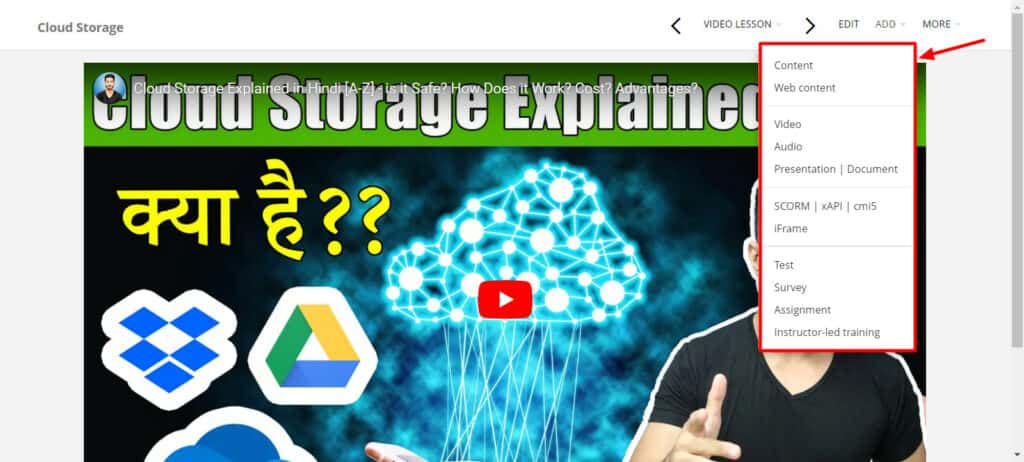
2) Multiple Lesson Types
Instructors can provide better online education to their students via multiple lesson types. Talent LMS lets you create text lessons, Web Content, Video, Audio, Presentation, iFrame, and Scorm lessons.
3) Live Conference
If you wish to conduct live classes, you get the option to connect to Zoom. However, you can only conduct up to 3 conferences on the free plan.
4) Variety of Quizzes
With Talent LMS, you can quickly create multiple types of quizzes to assess your students. It offers Tests, Surveys, and Assignments that are effective methods of evaluation.
It also supports multiple question types for quizzes, including MCQs, fill-in-the-blanks, ordering, drag-and-drop, and free text.
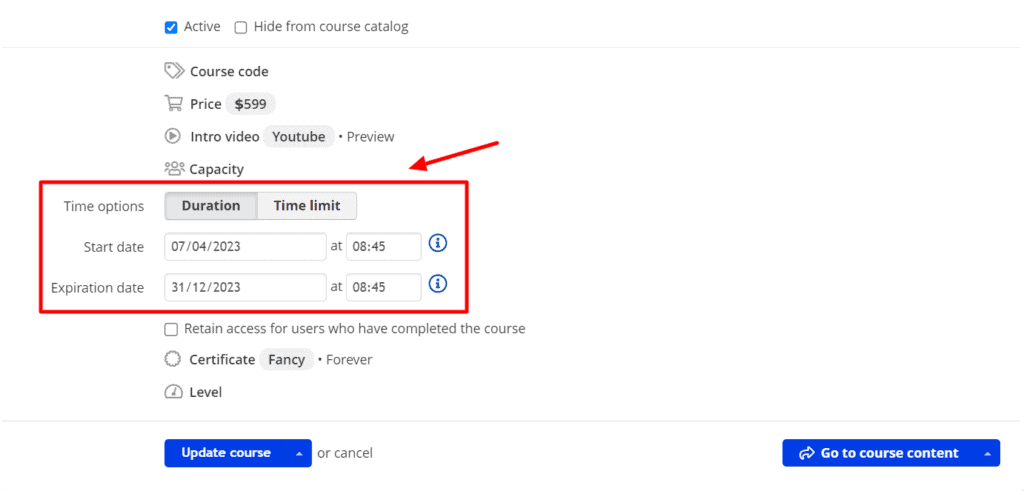
5) Drip Scheduling
Talent LMS lets you schedule your lessons in a specific order. You can specify the delayed availability by the number of hours or days. However, it doesn’t let you drip your lessons by date.
6) Additional Features
Talent LMS offers a range of additional features like discussions, student groups, conferences, calendar events, course intro video, student capacity, course level, etc.
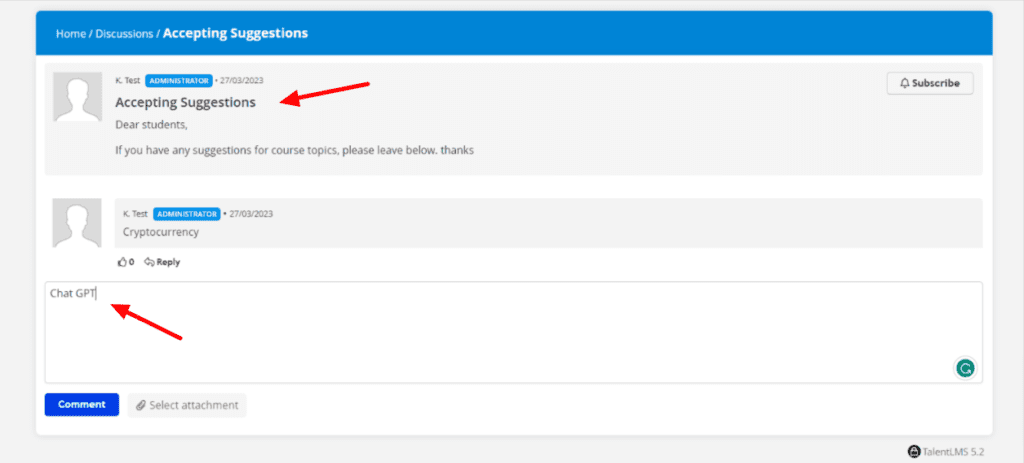
7) Decent Security Features
If you are concerned about the security of your platform, you can enable user captcha verification on signing up. Along with that, you can also enforce password changes to prevent unauthorized logins.
Cons
1) 5 Users
You can only add a maximum of 5 users on the free plan of Talent LMS. This includes instructors as well as students. You need to manually enter the student details or enroll them in bulk via a CSV file.
2) Limited Student Payment Models
The free plan only features the Subscription model, where you can specify Stripe or PayPal as payment methods.
3) No customization Allowed
You cannot make any customizations on the design of your home page or course pages.
Conclusion
The free plan of Talent LMS looks pretty average. It lets you design 10 free courses along with multiple lesson types, quizzes, and a drip schedule feature.
However, the biggest downside of Talent LMS is the extremely limited number of students. You can only enroll a total of 5 users, including instructors and learners.
Overall, I cannot recommend it to a professional user. If you are an absolute beginner who just wants to test an LMS platform, you can check this out!
9) TrainerCentral
TrainerCentral is an online course creation and training platform offered by Zoho Corporation in 2021. They built this platform to make knowledge sharing easier and more accessible to everyone.
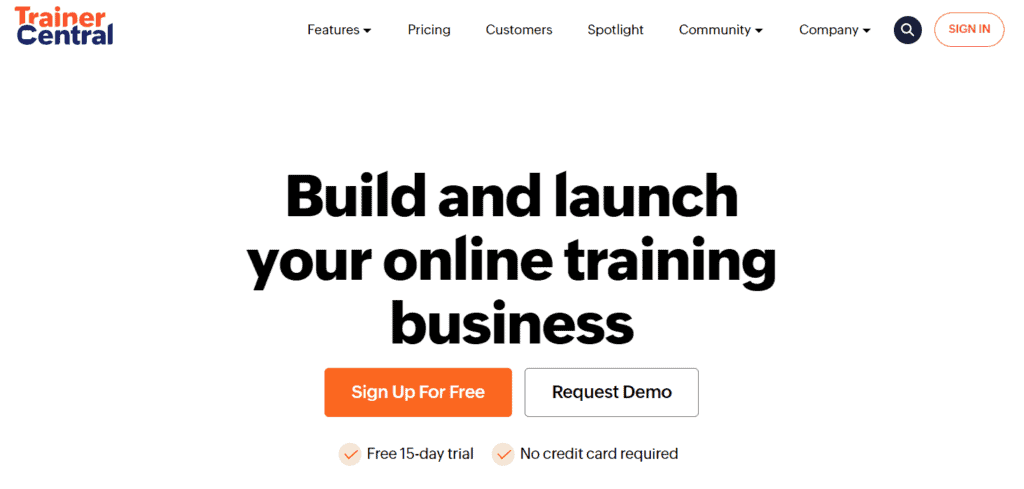
| No. of Courses | 3 |
| No. of Students | Unlimited |
| Types of Lessons | Text |
| Video Uploads | Yes |
| Transaction Fee | N.A. |
| Pricing | Free, Paid plans start at ₹1,166.67/month |
| Website | Visit TrainerCentral |
Pros
1) Unlimited Students
There is no limit to the number of students signing up for your courses. You can have unlimited students taking your online courses.
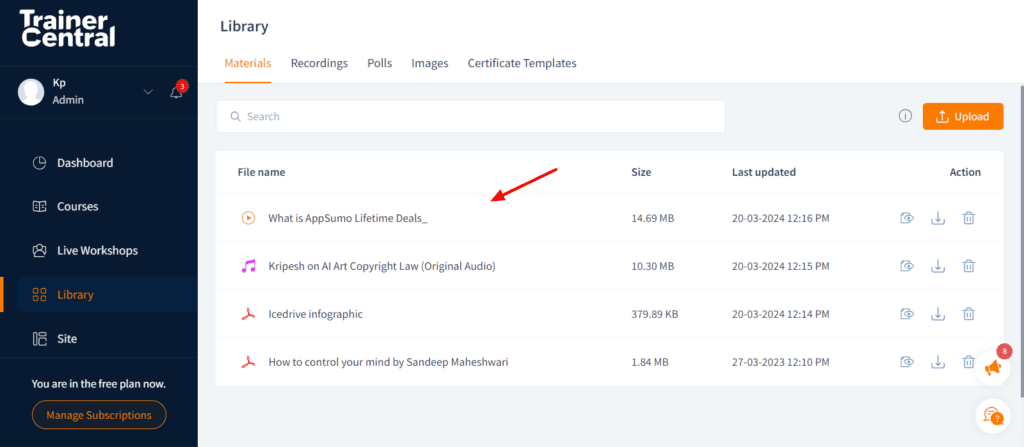
2) 5 GB Storage
It features a 5 GB cloud storage space on the free plan. This is great for uploading all kinds of training material in the library, like PDFs, videos, images, audio recordings, etc. You can then use them in any of the course chapters.
3) Decent Lesson Types
You can create a few types of lessons on TrainerCentral. These include text lessons, files, images, and links. It allows you to link web pages, YouTube videos, and other relevant educational materials.
4) SEO Features
You can optimize your courses for search engines with its SEO features. It allows you to add a meta title, keywords, and meta description for your course. You can also insert custom code in the header and footer to implement extra functionality.
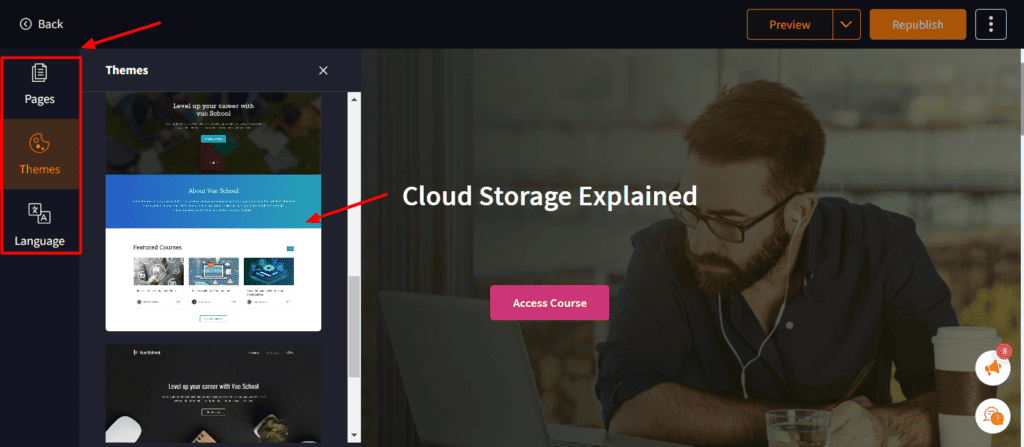
5) Landing Page Builder
By default, it features 3 pages for each created course – a home page, a thank you page, and a sales page. You can switch between 4 attractive themes and add new pages as well. It offers 13 different sections to build a complete page.
Cons
1) Major Features Missing
It lacks almost all the key features of an LMS. You won’t find quizzes, analytics, student payments, marketing tools, drip scheduling, user engagement, security, etc on the free plan.
2) Cannot Sell Courses
The free plan of TrainerCentral doesn’t allow you to sell your courses or add student payment models. All your courses are free by default.
TrainerCentral Demo Course
I created a demo course on TrainerCentral, titled “Cloud Storage Explained“. In this course, I added all types of available lessons and tried out all the features available on the free version. You can check it out by signing up for free as a learner.
Conclusion
TrainerCentral is an online course creation platform that lets you create 3 free courses, add unlimited students, and enjoy 5 GB of storage. You can create Text, File, and Link lessons for your students.
However, it lacks the key features of an LMS. If you want access to quizzes, drip scheduling, marketing tools, student engagement, and payment options, and sell your courses, you need to upgrade to their paid plan. Overall, it is not a good choice for professional instructors or educators.
If you’re a complete beginner who wants to publish simple notes or educational content for free, you can check it out. But if you wish to build a community of students and monetize your courses, the free plan won’t be of much help.
Testing Parameters
I researched the web and created free accounts on over a dozen free LMS platforms. Then, I designed an online course on every LMS by using various lesson types and integrating tools like quizzes, drip content, integrations, coupons, payment models, landing pages, etc.
I also tested the additional course settings like analytics and reports, certifications, customer support, security features, email notifications, etc, for every course creator and noted the results.
Finally, I compared these features with all the other course creators on the list and ranked them accordingly.
Why Should You Trust Me?
I have been working in the digital domain since 2015. In my journey, I have had to create many online courses for my audience. To offer interactive and engaging courses to my audience, I have used popular course creators like Thinkific, Teachable, Learnyst, Graphy, and more.
Using these LMS platforms for the last 2+ years has given me the required skills, knowledge, and expertise to identify good course-creation platforms.
Conclusion
Online course creators make it easier for instructors to create, manage, and sell their online courses. In this article, we looked at the best free online course creators. All these tools are best for beginners getting started with online teaching.
If you are a professional instructor who provides online education, you can start with the free plans and then upgrade to the paid ones when you need them.
Alternatively, you can also check out the premium plans of LMS platforms like Teachable, Thinkific, Graphy, Learnyst, etc.
Anyway, I hope you enjoyed reading this article. I would be happy if this article helps you choose the right LMS platform for your needs. Have you used online course creation tools before? Which one was it and how was your experience? Let me know in the comments box below.
This is Kripesh signing off. I will be back with more such informative content soon. Cheers! 🙂

Learnyst is not free. It’s actually very expensive at $49 per month.
Correct.
They recently removed their free plan.
Will update this article soon 🙂